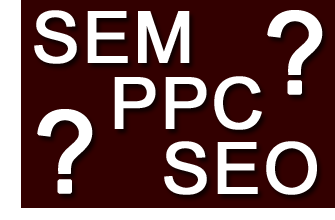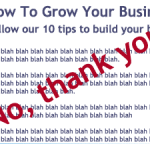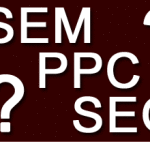SEO / SEM – The difference between organic search optimisation and paid search marketing
People often mix up the terms SEO and SEM. They are actually two entirely different things. so I will clarify both terms below. We are basically talking about organic search engine optimisation (SEO) versus paid search engine marketing (SEM/PPC).
SEO = Search Engine Optimisation
 When you do SEO for your website, you optimise it for the search terms (SEO keywords) you want to rank for in the search engines, so that people will be able to find your site better in the ‘normal’ (organic) search results.
When you do SEO for your website, you optimise it for the search terms (SEO keywords) you want to rank for in the search engines, so that people will be able to find your site better in the ‘normal’ (organic) search results.
If you know how to optimise your website and do it yourself, SEO doesn’t need to cost any money, only time and knowledge are needed.
Hundreds of factors are at play in SEO, but to name just a few – it’s very important to have:
- a well-structured website with descriptive internal links and page names
- good, interesting, relevant, optimised content on your pages that includes the right SEO keywords
- optimised Page Titles
- optimised META descriptions
- a number of quality back links from reputable websites to your website with important keywords in the link text.
SEM = Search Engine Marketing
Technically, Search Engine Marketing encompasses paid search methods as well as organic SEO. But most people use the term SEM when they are referring to the use of programs such as Google Adwords to be included in the paid results / sponsored listings in search engines.
The most common paid SEM methods are pay-per-click (PPC) arrangements whereby you place little ads that will appear at the top or on the right-hand side of the normal/organic search results. Every time someone searches for the term you have specified, your sponsored listing will appear. And each time someone clicks on your listing to go to your site, you pay the search engine (Google, Bing or Yahoo) a certain amount of money. You can set a limit so that you ad stops appearing when your budget has been spent.
Should you use SEO or SEM/PPC, or both?
The good thing about SEO is that, once your website has been optimised, you will continue to benefit from it without having to spend any money.
It is crucial for anyone with a website that it ranks well in the normal (organic/unpaid) search engine results for the keywords used by their target market to find their type of products or services. It can be the difference between having a successful and an unsuccessful website.
There are a few common reasons why people decide to use SEM/PPC methods such as Adwords for their site (although often in combination with SEO). These include:
- When you have just launched a new website that doesn’t rank well yet in the normal/organic search results
- When you have added a new product or service page/category that doesn’t perform well yet in search engines
- When you have a temporary/seasonal product or service offering you want to promote heavily for a short period
- When you are in a very competitive field and find it impossible to rank on the first page for certain highly competitive search terms
The downside of SEM/PPC is that you have to keep spending money in order to continue to appear on the search engine results page with your sponsored listing.
If you do use a PPC SEM program, it’s important to set it up correctly, target the best keyword phrases and to continually monitor the effectiveness of your campaign. If you pay $50 every day, or every week, for people to click on your listing and come to your website, you would want to make sure a good proportion of those people buy or sign up for something, or at least contact you with an enquiry. This is called ROI (return on investment). You’re obviously doing something wrong and throwing away money if you just get clicks but no new customers or leads.
The Importance of Keywords
For both SEO and SEM/PPC, keywords are very important. How do you know which terms and phrases to use to effectively target your potential customers? You’ll have to do some keyword research, or pay an SEO or SEM expert to do the research for you.
Here are 3 of the Biggest Mistakes people make when using SEM (e.g. Adwords):
- Wrong: Targeting keywords you already rank well for in organic search results. If you are #1 or #2 on Google.com.au for “Italian restaurant Sydney” for example, you would be crazy to target that phrase with your ads. That is obviously a waste of your money.
Right: Go for the keywords that are important to your business but that you don’t rank highly for (yet). Once your website performs better in the organic results for a certain phrase, you can drop that keyword phrase from your PPC campaign. - Wrong: Targeting very broad and extremely competitive keywords. These are very expensive and you may still end up on the second page of the search results. They also may not give you the best ROI as people may be looking for something different.
Right: Find a larger variety of more niche and very specific keyword combinations. They are less expensive and may give you very targeted, qualified traffic by people who are looking for the exact thing you are offering – resulting in a high ROI. - Wrong: Setting your campaign and letting it run without monitoring it. What if every click you paid for resulted in a bounce (people leaving your website again right away) and you didn’t know about it? Or what if competition became so fierce your ad hardly ever appears anywhere? You can’t ever forget about your PPC campaign.
Right: Use the available program features such as goals and alerts to monitor the effectiveness of your PPC campaign and make changes when needed for the best ROI.
Conclusion
If you were confused about the difference between SEO and SEM, or wasn’t sure which to use when, I hope this post has helped clear that up a bit.
My Content Writer business focuses on quality content and SEO, ensuring my clients’ websites have professional, informative, persuasive and search engine optimised content to perform well in the organic search results.
It really pays to invest in having a well-optimised website, because if you don’t, you may need to keep throwing money at SEM/PPC to appear on search engine results pages and get anyone to visit your website.
I have optimised my own website to perform well in organic search results. Because of that, I get a good amount of targeted visitors (people looking for my kinds of services) and I am always getting new clients through my website. I have NEVER had to spend any money on PPC or any other type of online or offline advertising. SEO is all I do and it works great for me!
If you need help optimising your website, contact me, SEO Content Writer Micky Stuivenberg, to discuss what I can do for you.


------------------------------
Comments are closed.